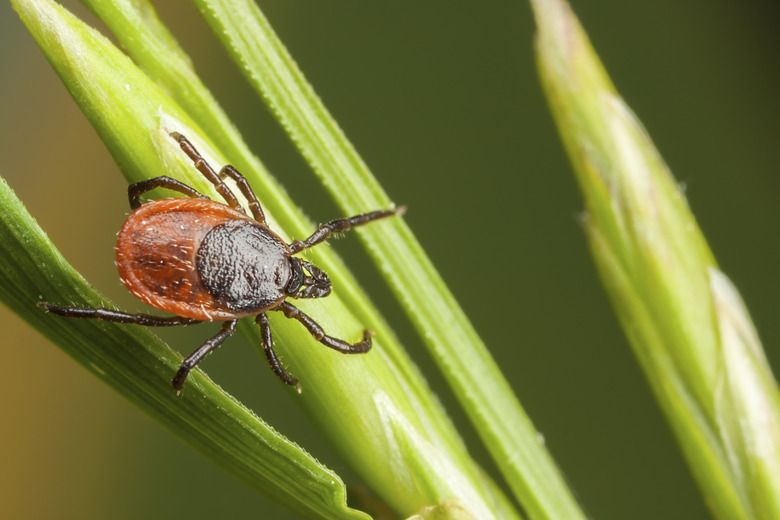What Are Spirochetes Bacteria In Dogs?
Spirochetes are a family of bacteria whose individual species can cause two types of disease in dogs — Lyme disease and leptospirosis. Many dogs may carry these bacteria without ever developing the illnesses associated with them, but if symptoms do develop, they are often life-threatening. Lyme disease may affect the nerves, kidneys, heart and joints, while severe cases of leptospirosis may cause liver or kidney failure.
Lyme Disease Transmission and Prevention
Lyme Disease Transmission and Prevention
Lyme disease, caused by the bacteria Borrelia burgdorferi, is primarily transmitted through infected bites from the deer tick, although other species of tick may carry the disease as well. The tick must be attached to your dog for between 24 and 48 hours for the bacteria to spread. Even after infection, most dogs will never develop symptoms of the disease.
Regularly checking your dog for ticks and promptly removing any you find will significantly reduce risk of Lyme disease. You can safely remove a tick by using a tweezers to grasp the head near the skin and pulling straight up. Do not twist or crush the tick's body while removing it, and wash your hands when you are done.
A topical tick control product will further protect your dog from both unwanted parasites and disease. In areas where Lyme disease is common, your veterinarian may recommend a Lyme disease vaccine, although there are some concerns about its safety and efficacy.
Symptoms of Lyme Disease
Symptoms of Lyme Disease
Lyme disease symptoms — which may not develop until months after a tick bite — may include fever, loss of appetite, fatigue, lameness, joint pain, facial paralysis and seizures. Kidney failure is common with this condition. Heart failure, while rarer, can occur. Even with successful treatment, lameness or joint pain may be permanent.
Your veterinarian may perform a special blood test for Lyme disease antibodies to confirm the diagnosis, since standard blood tests often do not indicate an infection.
Lyme Disease Treatment
Lyme Disease Treatment
Treatment of Lyme disease is typically a two- to four-week course of antibiotics, such as doxycycline. Most dogs respond quickly to treatment, although some do not recover. If the organs or nervous system are affected, your dog may need supportive care to address these symptoms.
If your dog tests positive for the Borrelia burgdorferi bacteria but doesn't have symptoms, most veterinarians will recommend waiting to see if symptoms develop, although some may suggest preventative antibiotics.
Leptospirosis Transmission and Prevention
Leptospirosis Transmission and Prevention
Leptospirosis can be caused by four different species of leptospira spirochete: canicola, icterohemorrhagiae, grippotyphosa and pomona. Dogs typically contract this disease by drinking infected water, although the bacteria can also pass through a cut in the skin.
Pigs, cattle, rats, raccoons, skunks and opossums are the most common carriers of leptospirosis. These animals may pass the infection to your dog by urinating in a water supply or leaving bacteria in soil, where it can live for up to six months.
Ensuring that your dog drinks only from clean water sources will help protect him from this condition. Depending on how common the infection is in your area, your veterinarian may also recommend vaccination and yearly booster shots.
Symptoms of Leptospirosis
Symptoms of Leptospirosis
Much like Lyme disease, most cases of leptospirosis won't have any symptoms, but those that do can be life-threatening. Four to 12 days after exposure to the bacteria, your dog may develop fever, vomiting, lethargy, diarrhea or bloody urine. Within hours or days of the beginning of symptoms, affected dogs will start to experience liver and kidney failure, which may result in a yellow color in the whites of the eyes, blood in the stools and bleeding from the mouth.
Your veterinarian may test for liver and kidney function or may test the urine for spirochetes to confirm the diagnosis.
Leptospirosis Treatment
Leptospirosis Treatment
Since it is a bacterial infection, leptospirosis can be treated with antibiotics, such as penicillin or doxycycline. Supportive care, such as IV fluids and medication to limit vomiting and diarrhea, may be necessary to prevent damage to the liver or kidneys.
Your veterinarian may recommend a seven- to 10-day course of antibiotics if your dog has been exposed to the bacteria, even if he isn't showing symptoms. Leptospirosis can transmit to humans, so you must be careful with the infected animal's urine to prevent the spread of disease.
Always check with your veterinarian before changing your pet's diet, medication, or physical activity routines. This information is not a substitute for a vet's opinion.
References
- Google Books: The Pathogenic Spirochetes: Strategies for Evasion of Host Immunity and Persistence
- Merck Manual Pet Health Edition: Lyme Disease (Lyme Borreliosis) in Dogs
- WebMD: Canine Leptospirosis
- Companion Animal Parasite Counsel: Vector-Borne Diseases – Lyme Disease
- Merck Veterinary Manual: Leptospirosis in Dogs
